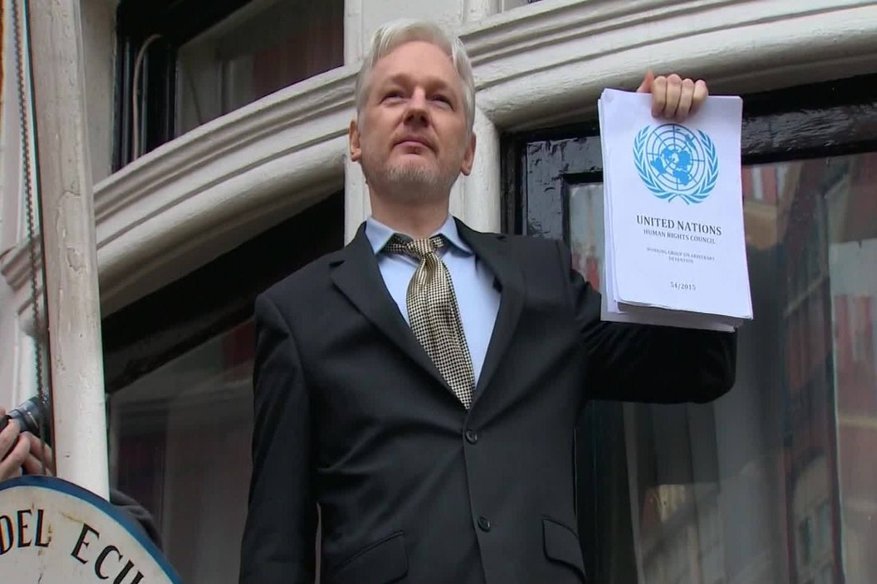Julian Assange’s Hacking Charges, and Where It Go Wrong

Julian Assange’s lawyers want to see if hacking is protected by the First Amendment.
London’s Metropolitan Police arrested Assange on Thursday at the Ecuadorian Embassy, where he’d been granted asylum for seven years.
The US government wants to extradite Assange over hacking charges. But Assange’s lawyers have a bigger concern. His lawyers argued that the US’ hacking allegations against Assange were an attack on press freedom.
US prosecutors argue that the password-cracking agreement broke the law, and they indicted Assange over the alleged hack attempt, not the decision to publish the stolen content.
In an indictment unsealed on Thursday, the Justice Department charged Assange with conspiracy to crack a password for a classified US government computer. If convicted, Assange could face a maximum penalty of five years in prison.
“It’s called conspiracy, it’s a conspiracy to commit journalism,” WikiLeaks’ editor-in-chief, Kristinn Hrafnsson, said at a press conference. “We urge everybody to support Julian Assange in fighting his extradition.”
Press freedom advocates have spoken out against the arrest, arguing that Assange and WikiLeaks were working as journalists through the attempted hacking and publishing of classified information. But media law and security experts disagree with that argument.
While what WikiLeaks published did have journalistic value — military documents leaked in 2010 showed American attacks in Iraq — Assange isn’t protected if he committed a crime to obtain those documents, experts said.
“If someone else broke the law by hacking government sites and then turning over material to WikiLeaks, then that fits into a traditional journalistic function,” said Roy Gutterman, a media law and free speech professor at Syracuse University. “But if WikiLeaks personnel actually did the hacking, then the government might have a strong case.”
Journalists have published stolen and classified documents in the past, press freedom protected through landmark Supreme Court cases like Bartnicki v. Vopper in 2001 and The New York Times v. the United States in 1971.
But in both of those cases, the press was protected because it wasn’t stealing the documents that it published.
By allegedly offering to hack the US’ computers, Assange is going beyond what a journalist would do, said Dave Kennedy, chief executive at security consultancy TrustedSec.
“This is not a boundary that anybody would cross,” Kennedy said. “There’s a fine line between interviewing somebody that robbed a bank, and helping that person rob the bank and then interviewing them.”
Under the Obama administration, the Justice Department didn’t press charges against WikiLeaks, concluding that the work was considered journalism.
After Assange’s arrest Thursday, NSA whistleblower Edward Snowden criticized the US’ charges, calling the allegation weak and “shocking.” Press freedom advocates agreed.
“The Trump administration has used the same information to manufacture a flimsy and pretextual indictment involving a ‘conspiracy’ to violate the Computer Fraud and Abuse Act — based entirely on alleged conversations between a journalist and source,” Trevor Timm, executive director of the Freedom of the Press Foundation, said in a statement.
Timm noted that journalists frequently interact with anonymous sources and use encrypted messengers and that this indictment was a threat to a free press.
The Knight First Amendment Institute at Columbia University echoed that sentiment, saying that Assange’s actions were “everyday journalistic practices.”
“Whether the government will be able to establish a violation of the hacking statute remains to be seen, but it’s very troubling that the indictment sweeps in activities that are not just lawful but essential to press freedom,” said Jameel Jaffer, the institute’s executive director.
Security experts said that offering to help hack and access documents wasn’t a regular practice they have seen with journalists.
“Speaking only on Signal or using SecureDrop, that’s source protection and I’m all about that,” said Jake Williams, founder of Rendition Infosec. “But offering to crack the password hash, that’s moving into a very active role and is an illegal or unauthorized intrusion.”
Critics also blasted the Justice Department’s charges by pointing out that Assange’s hacking offer wasn’t successful, but it doesn’t need to be under the Computer Fraud and Abuse Act.
Assange is set to appear in court again on May 2, as his lawyers prepare to fight the US’ extradition demands.
Source: https://thehackernews.com/2019/04/wikileaks-julian-assange-arrested.html
Also, Read:
Cyber Criminal Who Laundered £3bn in Cryptocurrency Arrested
SIM Swapping Crypto Hijackers Arrested By Turkish Police
South Korean Hackers Arrested for Infecting Cryto Mining Malware